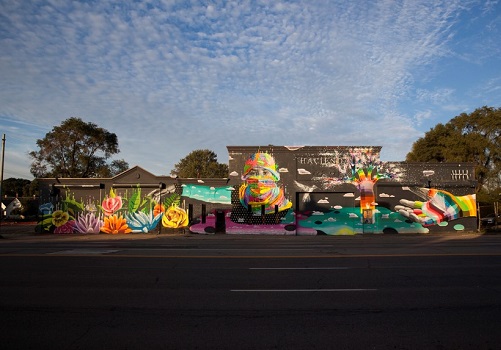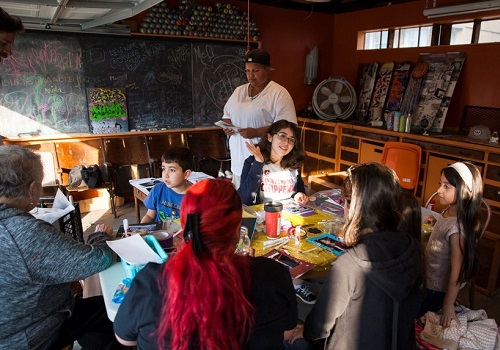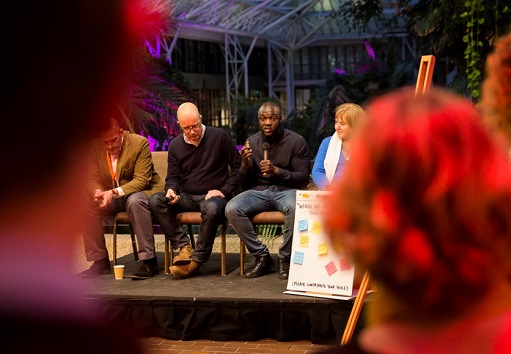From Dagenham to Detroit, neighborhoods are struggling to cope with our rapidly changing world. How can places ensure people can access the entire economic system?
We need innovative ways for communities to meet their complex needs in order to be healthy and to thrive. A currency exchange in grassroots community development from economic to social capital, profit to people priority, is changing how people and organisations are approaching this work.
Murals wrap Garage Cultural, a former tortilla factory and shipping center on Livernois in Southwest Detroit that is being reused as a community gathering place with a stage and music and dance studios in space donated by Hacienda Foods.
In both the US and the UK communities are racing to redefine themselves beyond their inherited identities—assigned as their streets and homes were built in the shadows of the corporations that employed their residents. They have since lost the jobs, securities, and benefits they expected would come from the hard work and time that the industry asked of them.
Yesterday’s economy, that values profit over people, still looms large and leaves behind too many people and places to ignore the complex problems it presents. We have learned and documented over time that the prioritization of profit does not translate to equitable and sustainable development for the whole.
Our work in Detroit is about an intentional shift in community development from a priority on profit to people and the passions and processes that animate them.
Inside Southwest Detroit and our networks are striving to build responsive interventions rooted in local wisdom, assets and relationships at the intersection of residents’ passions and the community’s needs.
These approaches are supported by the University of Detroit-Mercy’s HOPE model of holistic community development that is central in our work. The model integrates Human, Organizational, Physical and Economic factors toward a comprehensive approach to a community’s healthy, sustainable, and equitable development.
Programming at Studio Luevanos, a repurposed garage on The Alley Project in Southwest Detroit, features intergenerational activities where residents create together and build relationships in the process.
It creates room for communities to access and engage in the development of the places and programs that are supposed to be for them because it celebrates people, putting them at the center of community development processes and outcomes.
Sharing in struggles has led us to discover a kinship in values here in the community. And sharing our assets has made us more autonomous in the face of structures and systems that no longer meet needs in our neighborhoods.
The same is true between Southwest Detroit and East London as we approach our respective communities’ needs starting with what we have.
At home and abroad broken civic and corporate systems have negatively impacted communities and have created opportunities to fill the gaps with creativity. But there are still more questions than answers in society that inherently values economic capital over social capital.
What does it take to build a new enterprising community when there is no infrastructure on the ground and civic support is limited or non-existent? How do we leverage the culture and creativity of people on the ground to build more resilient communities? How can we bring diverse communities together? How can communities empower their residents to become social entrepreneurs who change their own communities for the better?
Residents and their innovations are not waiting for permission or limited resources to begin addressing issues in their own neighborhoods. They are at the center of an innovative, holistic community development process whereby communities can develop the capacity to meet many of their own needs through existing community assets.
People, passions, and process are tools for building sustainable communities that flourish as they begin to meet their own needs in fellowship and creative problem solving.
Earlier this year, Unltd’s Enterprising Communities: People Transforming Where They Live conference convened at the Barbican Centre in London to celebrate the type of social entrepreneurship that sets us on this path to a new economy that is not run simply on currency.
Stephen Addison addresses the audience at the Enterprising Communities conference about not waiting around for money and other resources from outside the community to get busy using your skills and interests to meet needs.
UnLtd helps enterprising people build businesses for good; it’s the UK’s largest support of social entrepreneurs. The organisation has several programmes to identify and support grassroots initiatives that are meeting community needs beginning with what already exists in communities—its people, their passions, and inclusive processes that are meeting community-identified needs. The event highlighted, among other topics, where people and communities are working together in this way.
Stephen Addison, founder of Box Up Crime in the London borough of Barking and Dagenham, encouraged attendees of the conference to support communities by meeting needs with what is already available during a panel discussion at the conference. He said, “When you’re trying to solve a social problem you can not wait to be commissioned by central government. This comes from a more divine commissioner which is eternal.”
His organization works with youth of all ages in East London through mentoring, in-school programming, training, competition and more. Participants find their way to Box Up Crime’s programming through their schools, word of mouth, and even court referrals.
Programs like Boxing Up Crime are modeling approaches that hopefully will raise up new leaders across London inspired by how social entrepreneurs can have such an impact in their own communities simply by following their talents and interests into a career that meets others’ needs in fulfilling ways.
Erik Howard was one of the guest speakers at UnLtd’s Enterprising People conference in early 2018. He is the co-founder of Inside South West Detroit, Young Nation and The Alley Project. Erik has been building communities and neighbourhoods through cultural and place-based activities such as low-riding and street art. More information on his work is here: http://erikpaulhoward.com/
UnLtd is creating a future where enterprising people are transforming our world for good. With social and economic inequality growing in the UK, more people than ever are using innovative and sustainable business solutions to help drive social change. Supporting social entrepreneurs in their local communities is one of three impact areas for UnLtd. More information on its work is here: https://unltd.org.uk/our-work/our-focus-areas/resilient-communities
The Local Trust helps residents to develop and use their skills and confident to identify what matters most to them and to take action and change things for the better. More information its work is here: http://localtrust.org.uk/




